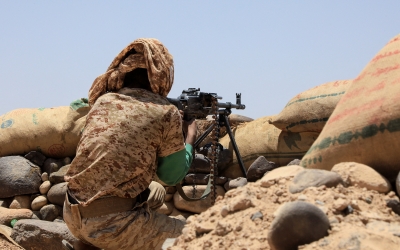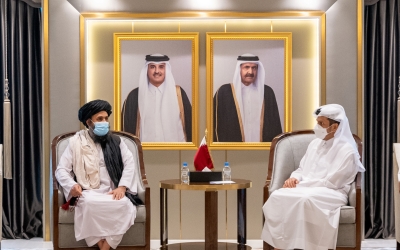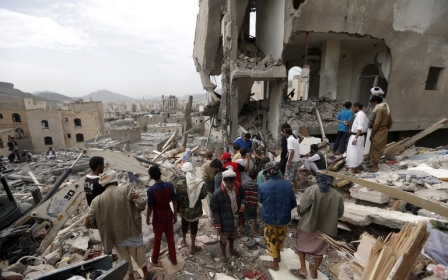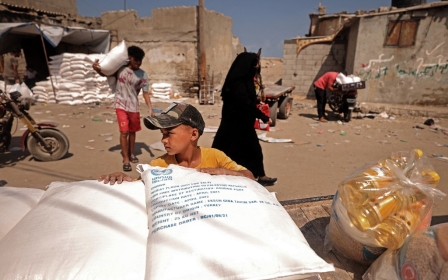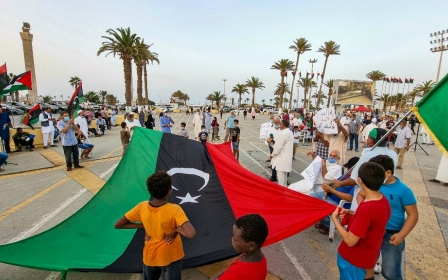UN General Assembly 2021: Here's what world leaders said about the Middle East
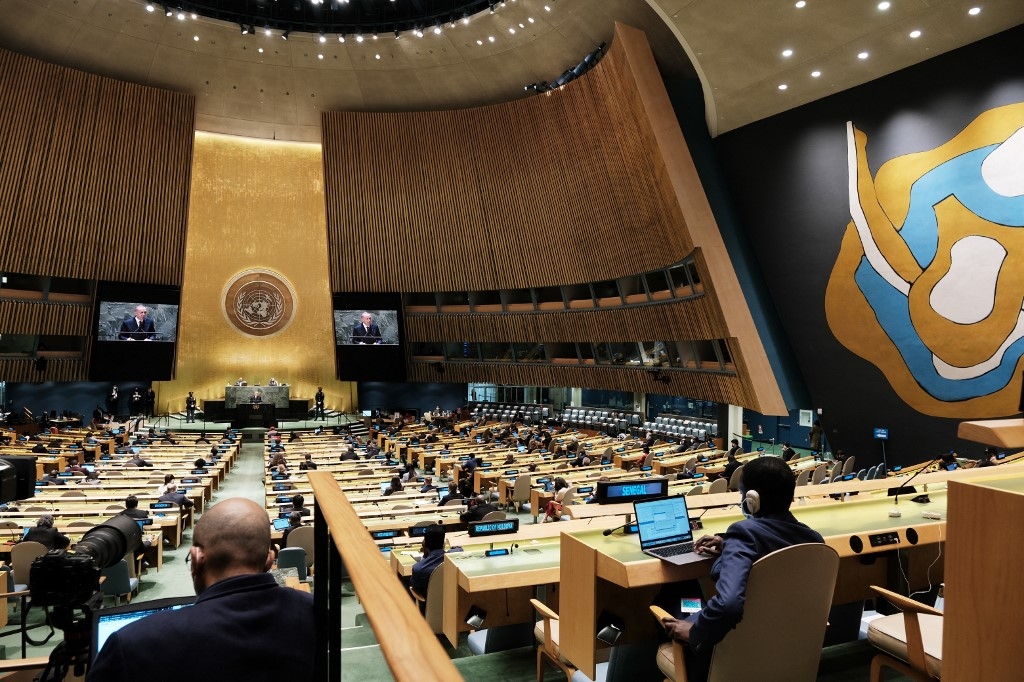
World leaders returned to the annual United Nations General Assembly debate on Tuesday, delivering remarks both in person and virtually, after the Covid-19 pandemic prompted the session to go fully online last year.
In addition to focusing attention on efforts to boost the fight against Covid-19 and climate change, a number of leaders discussed the most pressing issues for the Middle East - from the US withdrawal from Afghanistan to the wars in Syria and Yemen, to the Iran nuclear deal.
The international body also warned that political divides were hindering efforts of peace in multiple conflicts, including in Yemen and Libya, and called on countries to come together to help achieve lasting political settlements.
Here is what world leaders said about the Middle East during the first day of the 76th general debate.
United Nations
United Nations Secretary-General Antonio Guterres said the world was in danger of increased geopolitical divisions that are undermining international cooperation and called on countries to come together to end conflicts, including in the Middle East.
"In places like Yemen, Libya, and Syria, we must overcome stalemates and push for peace," Guterres said during his speech at the UN General Assembly on Tuesday morning.
Yemen's conflict began in 2014 when Houthi forces seized the capital, Sanaa, sparking a civil war that prompted Saudi Arabia and its allies to intervene in March 2015, carrying out a massive bombing campaign.
The UN has declared it the "world's worst humanitarian crisis", with the conflict having seen more than 230,000 people killed and 80 percent of the population dependent on aid.
Libya is currently on track for nationwide elections in December as a part of a UN-led process to end the conflict there. However, the parliament in eastern Libya has passed a no-confidence vote in the country's unity government, dealing a new blow to the international body's peace efforts.
On Israel and Palestine, Guterres urged "leaders to resume a meaningful dialogue recognising a two-state solution as the only pathway to a just and comprehensive peace".
Still, Israel's ambassador to the UN said last week that the "current Israeli government thinks differently and believes that it's not currently achievable", referring to the two-state solution.
United States
US President Joe Biden appeared in person at the United Nations headquarters in New York, giving a speech where he spoke of the fight against Covid-19, climate change, and Washington's shift in focus to the Indo-Pacific region.
Biden spent little time speaking about issues in the Middle East but emphasised that he remains committed to peacefully resolving the dispute with Iran over its nuclear programme.
"The United States remains committed to preventing Iran from getting a nuclear weapon," Biden said.
"We're prepared to return to full compliance if Iran does the same," he said, referring to US promises under the accord to lift sanctions.
He also vowed to defend US ally Israel but said a two-state solution with the Palestinians is still needed but a distant goal.
"Our support for an independent Jewish state is unequivocal. But I continue to believe that a two-state solution is the best way to ensure Israel's future as a Jewish democratic state living alongside a viable, sovereign, and democratic Palestinian state," he said.
"We're a long way from that goal at this moment."
Qatar
The ruling emir of Qatar urged world leaders to remain engaged with the Taliban following its takeover of Afghanistan.
Speaking at the event in person, Sheikh Tamim bin Hamad Al Thani, emphasised "the necessity of continuing dialogue with [the] Taliban because boycott only leads to polarisation and reactions, whereas dialogue could bring in positive results".
No nation has so far recognised the Taliban government, whose cabinet is stacked with senior figures previously detained in Guantanamo Bay or are on a United Nations sanctions list.
Qatar has played an outsized role in Afghanistan since the US withdrawal. The tiny Gulf nation assisted in the evacuation of western personnel and Afghans following the Taliban takeover. It is also supporting the distribution of aid and operations at Kabul’s airport.
Sheikh Tamim addressed the diplomatic clout Qatar has achieved by carving out a position for itself as the new moderator between the Taliban and the international community, stating: “We were confident that war offers no solution and that there would be dialogue in the end.”
While the Taliban recently announced the addition of some ethnic minorities and technocrats to the Pashtun dominated government, they have yet to name any women to their cabinet and secondary schools for girls remain shut.
At the UN, Sheikh Tamim stressed the need to learn from previous intervention in Afghanistan “to impose a political system from outside”.
"Regardless of intentions, efforts made and money invested, this experience in Afghanistan has collapsed after 20 years," he added.
Turkey
President Recep Tayyip Erdogan said the "international community cannot allow the Syrian crisis to linger on for another ten years", as he defended Turkey's military operations in the country and asked other nations to share the burden of hosting refugees.
"We are battling on the ground terrorist organisations that have drowned the region in blood and tears," Erdogan said in person.
In recent weeks, Turkey has escalated its attacks on Kurdish PKK forces. Turkey launched an invasion into northern Syria in 2019 after a partial US withdrawal from the region and has been accused of human rights abuses.
Erdogan also addressed ongoing tensions in Idlib province, the last stronghold of the opposition to President Bashar al-Assad. During his speech, Erdogan claimed that "thanks to our footprint in Idlib, we have saved the lives of millions of people".
'As a country that saved human dignity in the Syrian crisis, we no longer have the potential nor the capability to observe new immigration influxes'
- Recep Tayyip Erdogan
Turkey and Russia are enforcing a shaky ceasefire in the province, but concerns are growing about a government assault on the rebel stronghold which also houses militant groups like Hayat Tahrir al-Sham (HTS).
Turkey is concerned an assault could unleash a new migration wave at a time when it already hosts four million Syrian refugees and is faced with a possible arrival of displaced persons from Afghanistan.
"As a country that saved human dignity in the Syrian crisis, we no longer have the potential nor the capability to observe new immigration influxes," Erdogan said. "It is high time for all the stakeholders to do their part on this issue."
The Turkish president also addressed tensions in the Eastern Mediterranean over maritime disagreements and the conflict in Libya. "I reiterate my call to the international community to stand by the legitimate government which represents all regions of Libya."
Erdogan identified the Palestinian-Israeli conflict as "one of the most important problems that fuels instability and threatens peace and security in our region".
He said the revival of the peace process centred around a two-state solution with Jerusalem as the capital of a Palestinian state remained a "primary objective" for Turkey.
Iran
In his first speech at the UN General Assembly, President Ebrahim Raisi called for a resumption of nuclear talks with world powers and the removal of US sanctions.
"The Islamic Republic considers the useful talks whose ultimate outcome is the lifting of all oppressive [US] sanctions," Raisi said in a pre-recorded message to the assembly.
He added that the sanctions, imposed by former US President Donald Trump in 2018 after he left the nuclear accord, "were crimes against humanity during the coronavirus pandemic".
Indirect talks that began in April between Iran and the US to revive the 2015 nuclear agreement stopped two days after Raisi's electoral victory in June.
Tehran said on Tuesday that talks with world powers in Vienna to reinstate the nuclear pact would resume in a few weeks, and US President Joe Biden said during his UN speech that the US was "prepared to return to full compliance if Iran does the same".
Still, Raisi, who himself is under US sanctions, said the Islamic Republic "does not trust the promises made by the US government".
The Iranian president criticised the United States in his UN address, pointing to the collapse of the western-backed government in Afghanistan and the mob attack of the US Capitol on 6 January by Trump supporters seeking to overturn his defeat.
He said those two events highlight "the US hegemonic system has no credibility, whether inside or outside the country".
Egypt
Egyptian President Abdel Fattah el-Sisi delivered a video address to the UN, in which he spoke about the Israel-Palestine conflict and criticised Ethiopia's ongoing efforts to build a giant hydropower dam on the upper Nile River.
"The Nile is Egypt's lifeline," Sisi said, adding that Egyptians feel anguish over the controversial project.
The Grand Ethiopian Renaissance Dam (GERD), set to be Africa's largest hydroelectric project when completed, has been the source of an almost decade-long diplomatic stand-off between Ethiopia and the downstream nations of Egypt and Sudan.
Addis Ababa has long argued that the project is essential to its development, but Cairo and Khartoum fear it could restrict access to water.
Sisi also took time at the podium to address the issue of human rights in the country, claiming "the situation of human rights in Egypt has recently seen marked developments.”
Egypt has been accused of serial human rights abuses by international NGO’s and in May a group of UN member states issued a joint declaration expressing their “deep concern” for widespread human right violations committed with impunity by the Egyptian government.
The Egyptian president called for the need to improve the living conditions of Palestinians and ensure the delivery of humanitarian aid to them.
"Egypt has always reiterated that there can be no stability in the Middle East without a just, lasting, and comprehensive solution to the Palestinian question," Sisi said, adding that the issue was central for the Arab region.
Last week, Sisi held talks with Israeli Prime Minister Naftali Bennett, where the two sides reportedly discussed how to disarm Hamas and reduce the risk of hostilities in Gaza, Turkey's role in the Libyan conflict, and tensions over the Ethiopian dam project.
Egypt was the first Arab country to normalise relations with Israel in 1979. The two countries share a border and have maintained a tight blockade over Gaza since the Palestinian group Hamas began governing the territory in 2007.
Middle East Eye propose une couverture et une analyse indépendantes et incomparables du Moyen-Orient, de l’Afrique du Nord et d’autres régions du monde. Pour en savoir plus sur la reprise de ce contenu et les frais qui s’appliquent, veuillez remplir ce formulaire [en anglais]. Pour en savoir plus sur MEE, cliquez ici [en anglais].


